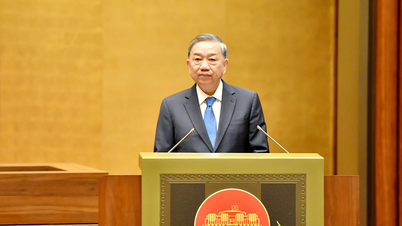At the 6th session, the 15th National Assembly voted to pass the Resolution on the State budget estimate for 2024, including the content on implementing salary policy from July 1, 2024.
Accordingly, from July 1, 2024, comprehensive reform of salary policy will be implemented according to Resolution No. 27-NQ/TW dated May 21, 2018 of the 7th Conference of the 12th Central Executive Committee; pensions, social insurance benefits, monthly allowances, preferential allowances for meritorious people and a number of social security policies currently linked to the basic salary will be adjusted.
Also from July 1, 2024, abolish all financial management and special income mechanisms of State administrative agencies and units; apply a unified salary, allowance and income regime. Do not continue to apply the current special mechanism to the regular budget according to the special financial management mechanism (operating expenses, capacity building, modernization, ensuring professional activities...) of State administrative agencies and units...
At the end of December 2023, the National Wage Council met and unanimously recommended to the Government a plan to adjust the minimum wage applicable from July 1, 2024, increasing by an average of 6%, equivalent to an increase from VND 200,000 to VND 280,000. Thus, if approved by the Government, the regional minimum wage will increase from July 1, 2024, at the same time as the public sector wage reform.
And with a 6% increase, the monthly minimum wage applied from July 1st in Region I increased from 4.68 million VND/month to 4.96 million VND/month. Region II increased from 4.16 million VND/month to 4.41 million VND/month. Region III increased from 3.64 million VND/month to 3.86 million VND/month. Region IV increased from 3.25 million VND/month to 3.45 million VND/month.
According to Resolution No. 01/NQ-CP dated January 5, 2024 of the Government on the main tasks and solutions to implement the Socio -Economic Development Plan and State Budget Estimates for 2024, in May, the Ministry of Labor, War Invalids and Social Affairs must complete the Decree regulating the minimum wage for employees working under labor contracts.
Minister of Home Affairs Pham Thi Thanh Tra said that according to the salary reform plan, from July 1, the average salary of civil servants and public employees is expected to increase by about 30% (including basic salary and allowances). This salary level will continue to be adjusted to increase by an average of about 7% per year from 2025. Accordingly, the new salary policy expands the salary relationship from the current salary coefficient of 1 - 2.34 - 10 to 1 - 2.68 - 12.
The purpose of the wage increase is to compensate for inflation and ensure the living standards of workers. This will be a great joy for millions of cadres, civil servants, public employees, and workers. Because according to a survey by the Institute of Workers and Trade Unions (Vietnam General Confederation of Labor) in April 2023 on nearly 3,000 workers in different industries and types of enterprises, the average income of workers including overtime and allowances is about more than 7.8 million VND/month.
With this income level, more than 75% of workers said that their salary and income do not meet their basic monthly living expenses, and many have to borrow money to cover their expenses. Specifically, about 17% of workers have to borrow money; more than 11% of workers said they have to do other jobs to earn more income. Even more than 12% of workers surveyed said they had to withdraw their social insurance at one time to cover their expenses.
Therefore, this salary adjustment is considered an encouragement for the staff, civil servants, public employees, and workers receiving salaries from the state budget and is also a great effort of the Government.
Increasing regional minimum wages and reforming wages are necessary in the context of many civil servants and public employees leaving the industry due to low wages. However, wage increases are only truly meaningful when inflation is controlled and appropriate and timely intervention options and market stabilization measures are always available when there are fluctuations.
So, the question here is what to do to limit the situation where wages have not increased but the prices of essential goods have increased? Because in reality, prices and wages are closely related to each other. Therefore, when wages are adjusted to increase, the prices of essential goods will also take the opportunity to "follow the rain". And this time is no exception, before the official wage increase, the prices of many essential goods have increased. Therefore, the problem is to control inflation, regulate the market, especially the prices of essential goods.
Some experts in this field believe that the reason why prices increase every time the State adjusts wages is because monopoly in buying and selling still occurs; the distribution system is still weak and has many intermediaries; the relationship between producers and retailers is still unfair...
Therefore, many experts recommend that the Government continue to promote the implementation of solutions to control prices, stabilize the market, forecast and make appropriate adjustments, contributing to ensuring inflation control according to the target. Focus on building and calculating the "dosage" and timing of price adjustment of goods and services managed by the State, moving towards eliminating monopoly in the trading of energy, electricity, fertilizers, coal, etc.
The important thing to keep prices stable is that we must have solutions to develop production, apply high technology, improve labor productivity to reduce product costs. Promote the development of the labor market, create many quality jobs, high income for workers. On the other hand, implement well the equality before the law of enterprises.
Along with that, ensure the supply, circulation, and distribution of goods and services are complete and uninterrupted, especially for strategic goods that are likely to be affected by the disruption of the global supply chain... Organize a strong enough distribution system in all regions. Supplement policies to develop production, reduce logistics service costs, resolve infrastructure bottlenecks such as roads, warehouses, and yards; promote the fight against counterfeit goods, trade fraud, tax evasion, and unfair competition. At the same time, establish a system of wholesale markets for agricultural products and food, conduct public and transparent buying and selling in the domestic market.../.
Source link





![[Photo] T&T 1 and Ho Chi Minh City 1 People's Police Teams won the men's and women's team championships](https://vphoto.vietnam.vn/thumb/1200x675/vietnam/resource/IMAGE/2025/5/22/39db06ae67cb4001b7a556e8d9a56d07)





















































































![[Podcast] Week introducing more than 500 OCOP products in Hanoi](https://vphoto.vietnam.vn/thumb/402x226/vietnam/resource/IMAGE/2025/5/22/d144aac2416744718388dbae3260e7fd)

Comment (0)